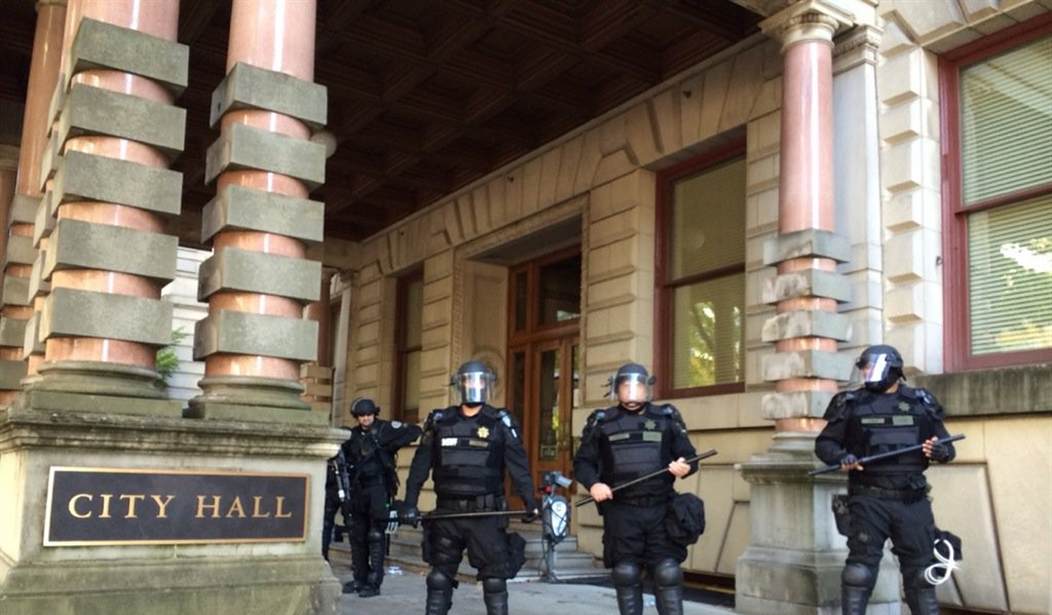What’s the first thing on the agenda for the municipal government in a city that’s been torn apart by riots and lawlessness for well over a year? In the case of Portland, Oregon, it’s “police reform.” During a press conference this week, Portland Mayor Ted Wheeler and his Police Chief, Chuck Lovell, rolled out some new rules for the cops in Portland. For one thing, they’re going to “deprioritize” traffic stops for things like busted headlights or expired registration tags. They will also be required to explain the driver’s rights to them if they do pull someone over and let them know that they don’t have to agree to a search of their vehicle if they don’t want to. And this is all apparently being done to combat racism or something. (KGW)
Portland police officers will no longer be directed to stop drivers for low-level traffic violations. They’ll also be directed to tailor their search protocols to prioritize getting and recording a driver’s informed consent.
Police Chief Chuck Lovell and Portland Mayor Ted Wheeler announced the new directives at a virtual press conference Tuesday. Officers, Lovell said, are being instructed to use their own discretion and de-prioritize stopping drivers for minor traffic infractions, like broken headlights during the day or expired tags. If police do stop drivers and want to search the car, the chief said, they’ll have to explain that the driver can say, “No.” They’ll also be required to hand out cards informing drivers of their rights and record audio of that conversation. Portland police don’t wear body cameras.
The police will use all of their newly unlocked free time to focus on crimes that lead to traffic accidents, such as speeding, DUI, and distracted driving, according to the Mayor. But the Police Chief was a bit more upfront in his explanation. He said that they simply don’t have enough officers to police “every crime.”
So rather than fighting back against the rampant lawlessness and finding a way to stem the flow of police officers out of the city, Portland has apparently decided to just throw in the towel. The bottom line seems to be that they don’t have enough cops to fight all of the crime, so they’ll simply stop enforcing some of the laws.
The funny thing about traffic stops, as most any police officer will tell you, is that they frequently lead to arrests for far more serious crimes. Handing someone a ticket for a cracked windshield might score the city twenty bucks in revenue, but when the driver turns out to have multiple felony warrants or their trunk is full of illegal firearms, you’ve accomplished a lot more in terms of public safety.
The racism element was introduced when Wheeler noted that Black Portlanders account for roughly 6% of the population, but they make up 18% of traffic stops. Is that a sign of inherent racism? The might be part of it. But as studies have shown in New York City, the real driving factor is poverty. Property crimes and drug crimes are both far more common in impoverished areas which tend to be overrepresented in minorities. (Wealthy people generally don’t commit the types of crimes you get pulled over in your car for. They get busted by the FBI.) If you really want to combat racial disparities in arrests, you could start by combatting poverty.
With all of that out of the way, we should probably point out the elephant in the room here. Portland has a lot of problems, but “too many traffic stops” is probably several hundred places down on the list. The government has lost control of portions of the city and their police are regularly under attack. Law and order has taken a beating and Ted Wheeler hasn’t done anything about it. Does he really think that this announcement is going to appease the people who are literally and figuratively trying to abolish the police? It’s a fool’s errand.








Join the conversation as a VIP Member